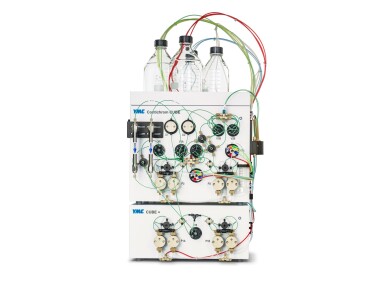Columns (LC)
Can Chromatography & Proteomics Predict COVID-19 Progression?
Nov 18 2020
Ever since last December, doctors have been searching for clues in their quest to better understand and treat patients suffering from coronavirus disease-19 and its aftereffects. Studies suggest that most patients, approximately 80%, who have a moderate case of Covid-19 will recover, whether they receive treatment or not. For the remaining 20% of patients suffering Covid-19, they are at risk of developing a more severe disease and are likely to require care in an intensive care unit. The prognosis for these patients is not so good, with many spending weeks in hospital and in some cases the disease can cause complications an prove fatal.
The ability to predict which patients might develop more serious forms of the disease would allow doctors to better direct their treatment regimes. Researchers in China have investigated whether proteins are altered in the blood serum of patients who developed a severs form of Covid-19. If this is the case, it could provide doctors will a tool to help in the fight against the disease – and chromatography was the tool they turned to.
Proteomics catches the protein changes
Proteomics is the large-scale study of proteins; it is the analysis of proteins in an organism and how they are produced or modified over time. It relies on the power of modern computers and the ability of instruments like liquid chromatography to separate out all the different proteins so they can be identified using mass spectrometry. The ability of liquid chromatography columns to separate out samples is discussed in the article, Practical Considerations for High-Throughput Chiral Screening in HPLC and SFC with 3- and Sub-2-µm Particle-Packed Columns.
Previous research has shown that proteomic profiling from blood serum can be informative during disease progression. A team in China hypothesized that proteins would be significantly altered in patients who develop severe Covid-19 after hospital admission. So, they set out to analyse whether this was the case using chromatography, mass spectrometry and enzyme-linked immunosorbent assay (ELISA).
Proteins could point the way to severity
The team recruited two groups and Covid-19 patients and a control group of healthy individuals. The researchers used liquid chromatography-mass spectrometry to characterize the proteomics of the patients and monitored the progression of the disease in the groups with Covid-19. The results are published in a letter in the journal Signal Transduction and Targeted Therapy.
In the paper - Identification and validation of predictive factors for progression to severe COVID-19 pneumonia by proteomics – the researchers report that they identified a panel of predictive factors to predict the potential deterioration of patients with moderate COVID-19 at admission before manifestation of severe symptoms. The predictive factors they identified could help identify patients who are at risk of developing severe forms of Covid-19, thus helping to save lives.
Digital Edition
Chromatography Today - Buyers' Guide 2022
October 2023
In This Edition Modern & Practical Applications - Accelerating ADC Development with Mass Spectrometry - Implementing High-Resolution Ion Mobility into Peptide Mapping Workflows Chromatogr...
View all digital editions
Events
Jan 20 2025 Amsterdam, Netherlands
Feb 03 2025 Dubai, UAE
Feb 05 2025 Guangzhou, China
Mar 01 2025 Boston, MA, USA
Mar 04 2025 Berlin, Germany












